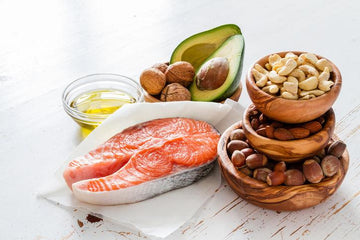

Bigger and Faster: How to Maximize Glycogen Replacement
Table of Contents
Caffeine Post-Exercise Maximizes Glycogen Replacement
by: Robbie Durand
This title is not a typo, but researchers found that taking caffeine post-exercise replenished glycogen levels faster than carbohydrates alone. Most pre-workout drinks contain caffeine for increased stamina and focus during exercise, but new research suggests that you may benefit from taking caffeine post exercise if you’re involved in aerobic exercise.
A new study published this week in Medicine in Sports and Science and Exercise determined that glycogen replenishment is essential for post exercise recovery and next day performance. Researchers examined whether muscle glycogen availability is associated with fatigue in a repeated exercise bout following short-term recovery. Ten endurance-trained individuals underwent two trials in a repeated measures design, each involving an initial run to exhaustion at 70% VO2max (Run-1) followed by a 4-hour recovery and a subsequent run to exhaustion at 70% VO2max (Run-2). A low-carbohydrate (Low Carbohydrate group; 0.3 grams per kg bodyweight per hour) or high-carbohydrate group (high-carbohydrate; 1.2 grams per kg bodyweight per hour) beverage was ingested at 30-minute intervals during recovery. Muscle biopsies were taken upon cessation of Run-1, post-recovery and fatigue during Run-2 in low carbohydrate group (F2). In high-carbohydrate, the muscle biopsies were obtained post-recovery, the time point coincident with fatigue in low carbohydrate group (F2) and the point of fatigue during the subsequent exercise bout. At the end of Run-2 was more prolonged for every participant in high-carbohydrate group than low carbohydrate group. Muscle glycogen concentrations were higher at the end of recovery in high-carbohydrate versus low carbohydrate group. The rate of muscle glycogen degradation during Run-2 was higher in high-carbohydrate than low carbohydrate group. The concentration of muscle glycogen was higher in high-carbohydrate than low carbohydrate group at F2 but no differences were observed between treatments at the respective points of exhaustion. Increasing carbohydrate intake during short-term recovery accelerates glycogen repletion in previously exercised muscle and thus improves the capacity for repeated exercise. The availability of skeletal muscle glycogen is therefore an important factor in the restoration of endurance capacity because fatigue during repeated exercise is associated with a critically low absolute muscle glycogen concentration. So the replenishment of glycogen is essential for recuperation the next day for exercise performance. The key is getting more glycogen in muscle.

Its well established that glycogen levels are enhanced with carbohydrates after exercise and the dose, timing, and frequency of carbohydrate administration have major roles in determining the rate and amount of glycogen re-synthesized throughout the postexercise recovery period. For example, the co-ingestion of caffeine with carbohydrates during exercise and exercise before increases glucose availability. Researchers examined the effect of co-ingestion of caffeine with carbohydrate on rates of muscle glycogen re-synthesis during recovery from exhaustive exercise in seven trained subjects who completed two experimental trials in a randomized, double-blind crossover design. The evening before an experiment subjects performed intermittent exhaustive cycling and then consumed a low- carbohydrate meal. The next morning subjects rode until volitional fatigue.

On completion of this ride subjects consumed either carbohydrate [4 grams per kg of body mass or the same amount of carbohydrate + caffeine (8 mg/kg of body-mass) during 4 hours of passive recovery. Muscle biopsies and blood samples were taken at regular intervals throughout recovery. At the end of the study, muscle glycogen levels were similar at exhaustion and increased by a similar amount (∼80%) after 1 hour of recovery. After 4 hours of recovery caffeine combined with carbohydrates resulted in higher glycogen accumulation. Accordingly, the overall rate of re-synthesis for the 4-hour recovery period was 66% higher in caffeine compared with carbohydrate alone. This is the first study to provide the first evidence that in trained subjects co-ingestion of large amounts of caffeine (8 mg/kg of body-mass) with carbohydrate has an additive effect on rates of postexercise muscle glycogen accumulation compared with consumption of carbohydrate alone.

















